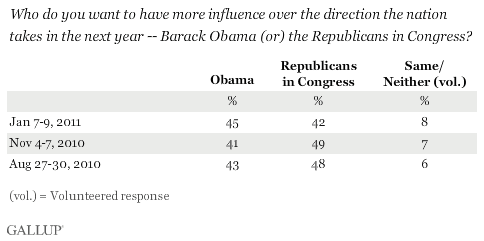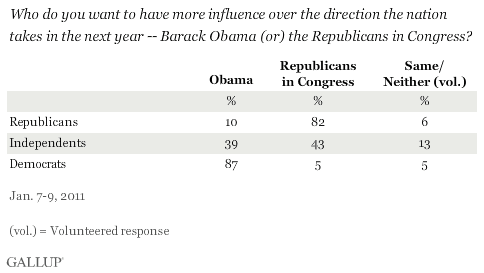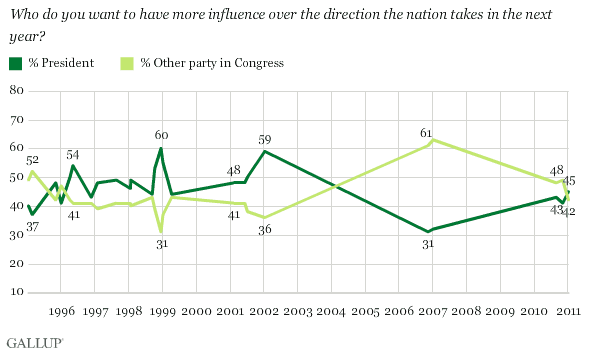PRINCETON, NJ -- Neither President Obama nor the Republicans in Congress are the clear leaders when Americans are asked whom they want to have more influence over the direction the nation takes in the next year. Forty-five percent want Obama to have more influence, while 42% prefer the Republicans. This marks a slight change from surveys conducted in August and early November of last year, when Americans expressed a slight preference for the Republicans.

The 112th Congress this week begins its first substantive work with Republicans in control of the House, after the pauses resulting from the Tucson shootings and the Martin Luther King Jr. Day holiday. One of the first items on the agenda will be a vote Wednesday on the proposed Republican legislation that would fully repeal Obama's healthcare bill -- a highly visible effort by the new Republican House leadership to challenge one of Obama's signature achievements in his first two years in office. Republicans then plan to introduce a number of additional measures designed to push back against Obama's policies of the last two years.
Naturally enough, Democrats and Republicans across the country have diametrically opposite views on who should have more influence over the direction of the country. More than 8 out of 10 Democrats want Obama to have more influence, while about the same percentage of Republicans want their leaders in Congress to have more influence. Independents are about evenly split, but tilt in the direction of the Republicans in Congress.

Gallup asked this same question at varying times during the previous two presidential administrations.
- Bill Clinton entered his third year in office in 1995 in a fairly weak position vis-à-vis Republicans in the minds of Americans -- significantly different than the position in which Obama finds himself today, at the beginning of his third year. In a February 1995 Gallup poll, 52% of Americans said the Republicans in Congress should have more influence, while 37% said Clinton should have more influence. By the spring of 1996, Clinton had gained the edge on this question, and after winning re-election in November of that year, he continued in a position of relative strength on this influence dimension for the most part during the final years of his administration.
- George W. Bush entered office in a positive position in 2001, with Americans indicating in surveys conducted prior to the Sept. 11 terrorist attacks that he should have more influence than the Democrats in Congress. After the war in Afghanistan started in response to the attacks, Gallup in January 2002 found an even stronger preference for Bush to have more influence. Gallup didn't ask this "influence" question again until November 2006, just after that year's midterm elections in which Democrats regained control of Congress. By that time, the American public's attitudes had shifted significantly, with almost a 2-to-1 preference that the Democrats in Congress should have more influence than President Bush.

Implications
Republicans are in a stronger political position as this new political year begins than they were last year, by virtue of their new control of the House and increased number of Republican seats in the Senate. Still, taken as a whole, the American public is not playing favorites -- with as many people wanting Obama to have more influence as want the Republicans in Congress to have more influence on the nation's direction over the next year.
The divided control of government could lead to more debate and political rancor than actual accomplishment coming out of Washington this year. If so, that may fly to a degree in the face of Americans' preferences about how government should work. Despite their split preferences on whom they want to have the greatest influence over the course of the nation, Americans generally prefer that their elected representatives attempt to compromise rather than sticking to their core beliefs and thus preventing things from getting done.
Survey Methods
Results for this Gallup poll are based on telephone interviews conducted Jan. 7-9, 2011, with a random sample of 1,018 adults, aged 18 and older, living in the continental U.S., selected using random-digit-dial sampling.
For results based on the total sample of national adults, one can say with 95% confidence that the maximum margin of sampling error is ±4 percentage points.
Interviews are conducted with respondents on landline telephones (for respondents with a landline telephone) and cellular phones (for respondents who are cell phone-only). Each sample includes a minimum quota of 150 cell phone-only respondents and 850 landline respondents, with additional minimum quotas among landline respondents for gender within region. Landline respondents are chosen at random within each household on the basis of which member had the most recent birthday.
Samples are weighted by gender, age, race, education, region, and phone lines. Demographic weighting targets are based on the March 2010 Current Population Survey figures for the aged 18 and older non-institutionalized population living in continental U.S. telephone households. All reported margins of sampling error include the computed design effects for weighting and sample design.
In addition to sampling error, question wording and practical difficulties in conducting surveys can introduce error or bias into the findings of public opinion polls.
View methodology, full question results, and trend data.
For more details on Gallup's polling methodology, visit www.gallup.com.
